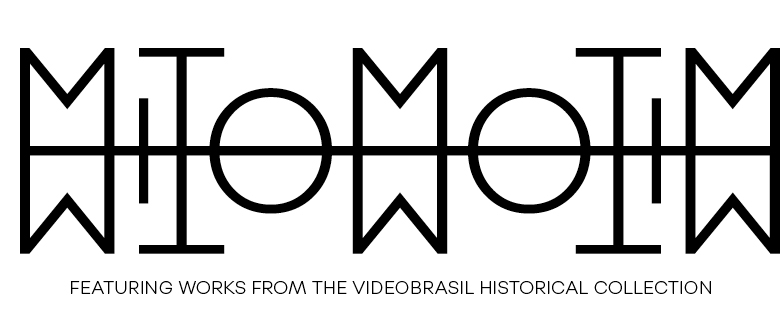MitoMotim is a one-line poem, a trivial feature in palindrome anthologies. It is graphic text and literary illustration. Like a game of vice versa, it should be read from front to back and from back to front. It is myth of mutiny, mutiny of myth. It relates to both chimeras and insubordination. It proposes the fabrication of worlds and, side by side, collective and disorganized, spontaneous and noisy insurgence, which revolts with whatever stone is at hand – be it poetic or political. MitoMotim mirrors a future time dulled by the past, as if history were unable to escape from successive returns. In this game of reflections it can be both action and the impossibility of action. The magic hypothesis or the pragmatic gesture. In present-day Brazil, it is invoked by the urgency of transformations
As an exhibition, Mitomotim brings together works from the Videobrasil Historical Collection dialoguing with pieces by guest artists. Among the vast collection of experimental film and video built up by this institution since 1983, productions stand out that challenge some of the foundations of our identity as Brazilian people, in line with the present. Among the works exhibited here are television shows from the late 1980s and early 1990s, independently and provocatively produced as discourse critical of mass media. Counter to hegemonic aims, they were interested in marginal images, unrepresented subjects, opening their microphones and positioning their cameras outside official takes, in search of the possible revolution. Alongside the TV material, contemporary works continue to address, decades later, anachronistic social fringes. The production of images, though much more abundant, nevertheless reveals new and old fractures. Among barriers and prohibitions, promises of revenge and plans of sabotage, the obsolescence of our project as a country is questioned.
In the mutiny of myths, on the other side of the barricade the works encounter a nation with self-indulgent qualities and farcical narratives: the discovery of terra brasilis, the boundless nature, the joyful resilience, the cordial man, the racial democracy, the country of the future. The question is how to reinvent this place that still allows itself to be deceived by bridges of order and progress. In the two-way street of senses, the myths of mutiny trigger a memory of uprisings invested with transgression and nonconformity. In this context, they raise questions on the modes of insurgence and the power to create other existences. The myths of mutiny defy art, as precarious as it is powerful, in its desire to stir up reality.
Júlia Rebouças
About the curator
Júlia Rebouças (Aracaju, SE, 1984) is an art curator, researcher and critic. She was co-curator at the 32nd São Paulo Biennial, Incerteza viva [Living uncertainty, 2016]. From 2007 to 2015, she worked as a staff curator at Instituto Inhotim, in Minas Gerais. She collaborated with Associação Cultural Videobrasil as part of the curatorial commission of the 18th and the 19th editions of the International Contemporary Art Festival Sesc_Videobrasil, in São Paulo. She was adjunct curator of the 9th Mercosul Biennial, in Porto Alegre, entitled Se o clima for favorável [If the climate is favorable], in 2013. She participates in several independent curatorial projects, develops editorial projects, writes texts for exhibition catalogs, artist’s books and collaborates with art magazines. She holds a doctorate degree from the postgraduate program in visual arts of the Federal University of Minas Gerais.
